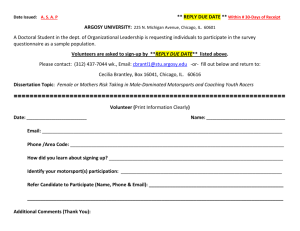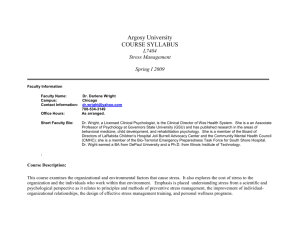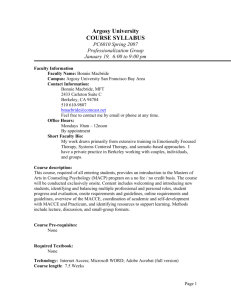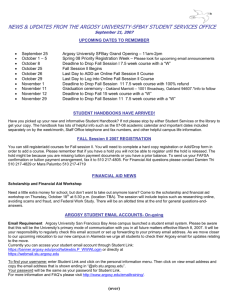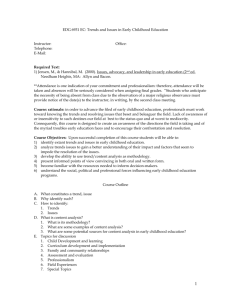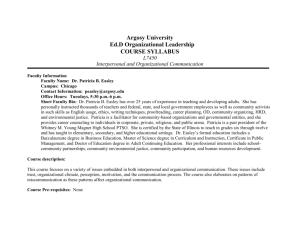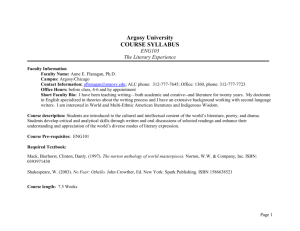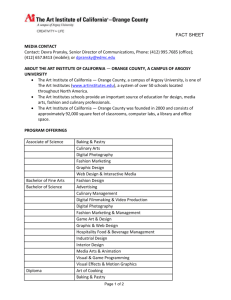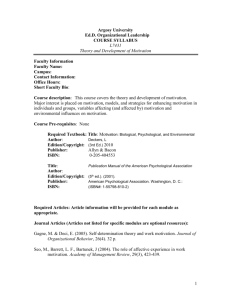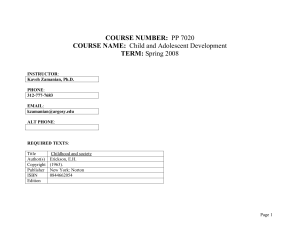Science and Technology - Argosy University Dissertation Site
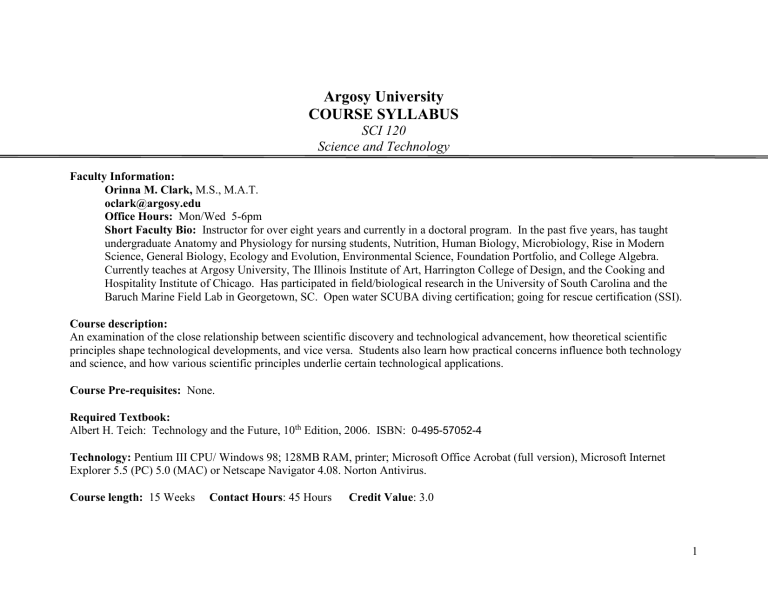
Argosy University
COURSE SYLLABUS
SCI 120
Science and Technology
Faculty Information:
Orinna M. Clark, M.S., M.A.T. oclark@argosy.edu
Office Hours: Mon/Wed 5-6pm
Short Faculty Bio: Instructor for over eight years and currently in a doctoral program. In the past five years, has taught undergraduate Anatomy and Physiology for nursing students, Nutrition, Human Biology, Microbiology, Rise in Modern
Science, General Biology, Ecology and Evolution, Environmental Science, Foundation Portfolio, and College Algebra.
Currently teaches at Argosy University, The Illinois Institute of Art, Harrington College of Design, and the Cooking and
Hospitality Institute of Chicago. Has participated in field/biological research in the University of South Carolina and the
Baruch Marine Field Lab in Georgetown, SC. Open water SCUBA diving certification; going for rescue certification (SSI).
Course description:
An examination of the close relationship between scientific discovery and technological advancement, how theoretical scientific principles shape technological developments, and vice versa. Students also learn how practical concerns influence both technology and science, and how various scientific principles underlie certain technological applications.
Course Pre-requisites: None.
Required Textbook:
Albert H. Teich: Technology and the Future, 10 th
Edition, 2006. ISBN: 0-495-57052-4
Technology: Pentium III CPU/ Windows 98; 128MB RAM, printer; Microsoft Office Acrobat (full version), Microsoft Internet
Explorer 5.5 (PC) 5.0 (MAC) or Netscape Navigator 4.08. Norton Antivirus.
Course length: 15 Weeks Contact Hours : 45 Hours Credit Value : 3.0
1
Course Objectives:
1.
Identify and discuss the ethical, legal, and social issues within fields/disciplines of science and technology (for example, the
Human Genome Project and changing definitions of disease, disability, and humanness; the Internet and reliability of knowledge; computers and the concept of privacy)
2.
Identify ethical conflicts that arise in scientific and technological fields, and as they influence society and culture
3.
Develop and enhance skills of understanding relevant to the subject matter, as perceived from the vantage of each participating discipline
4.
Analyze the pros and cons of several current issues related to science and technology
Assignment Table: assignments will be given out in the first class
Module Topics Readings Assignments Modules
(weeks)
1 *** assignments will be given out in the first
class
Thinking About Technology Chapter 1 - Does Improved
Technology Mean Progress?
Chapter 2 – How Society Shapes
Technology
Chapter 3 – The Technology of
Shoelaces
Chapter 4 - Can Technology
Replace Social Engineering?
Chapter 5 - Why I Am Not Going to
Buy a Computer
Chapter 6 - Technology and the
Tragic View
2
3
Debating Technology:
1960s Style
Dilemmas of New
Technology: Global Climate
Chapter 10 - The Role of
Technology in Society
Chapter 11 - Technology: The
Opiate of the Intellectuals
Chapter 22 – Modern Global
Climate Change
2
4
5
6
7
8
Change
Dilemmas of New
Technology: Terrorism and
Civil Liberties
Dilemmas of New
Technology I: Bioethics
Dilemmas of New
Technology: Computers and
Information
Debating Technology: 21
Century Style
CODA st
Chapter 23 – The Bush
Administration’s Approach to
Climate Change
Chapter 15 – Terrorism and Brittle
Technology
Chapter 16 – Technological
Vulnerability
Chapter 19 - The Dark Side of the
Genome
Chapter 20 – Remarks by the
President on Stem Cell Research
Chapter 21 – Hard Cell: A
Commentary on the President’s
Stem Cell Address
Chapter 24 – An Unforeseen
Revolution: Computers and
Expectations, 1935-1985
Chapter 25 – Computer Ethics
Chapter 26 – The Internet Under
Siege
Chapter 28 - In the Age of the Smart
Machine
Chapter 29 – The Logistics of
Techno-War
Chapter 12 – Why the Future
Doesn’t Need Us
Chapter 13 – A Response to Bill Joy and the Doom-and-Gloom
Technofuturists
Chapter 30 – In Touch at Last
3
Final Project: Term Paper (45% of final grade) ---- Due on Friday of Week 8 by 11:59pm (submitted via Email)
Read these instructions carefully and pace yourself (use the Assignments in the modules to keep on track):
Instructions: This term paper will give the students an opportunity to apply their class content information. Students will be writing a paper on some aspect of science and technology (the topic MUST be cleared with the instructor first). Choose a topic that is of interest to you – take this opportunity to learn something about it. This will be an opinion AND research-based paper --- meaning that you are trying to convince your readers of something (the merits of this research or technology, for instance). You must use scientifically rigorous sources (NOT WIKIPEDIA). Make sure it is from an educational or research institute. If you copy or paste anything directly, or plagiarize in ANY way ---- YOU WILL FAIL!!!!
Submission: All papers will be submitted as attachments to the instructor via Email (refer to front of syllabus). The instructor reserves the right to run all papers through www.turnitin.com
to analyze them for plagiarism. Topic examples may include: nanotechnology, stem cell research, clean energy research, current computer technology issues, future technology research, ethics and society with technology etc. You are taking a stance on some issue, backing it up by doing LOTS of research, including statistics, etc.
Format: The term paper will have the following format:
use a word processor (in Word document form from Windows 1995 – Windows Millenium) – absolutely no pdfs, docx, or word for MAC (use the school computers to convert files into PC Word formats)
1-inch margins, default font style (times new roman or arial), 12 font size, 1.5 spaced
separate title page with: title of paper, your name, date, class, instructor
separate references page with: APA style references (make sure you cite them in the body as well) – AT LEAST FIVE references (at least four of those must be professional) o google “OWL purdue” and visit for tutorials and references on APA formatting and bibliography
use separate appendix pages for pictures/graphs (3 max.) – letter them (A, B, etc.). DO NOT put pictures or graphs in the body of the paper
body of paper must be 6-8 pages long ( no shorter than 6 ) – this does NOT include title, reference, or appendices.
4
Grading Criteria:
Grading Scale
A
A-
B+
B
B-
C+
100 – 93
92 – 90
89 – 88
87 – 83
82 – 80
Grading requirements
Attendance/participation
Total
15%
Weekly Online Assignments 40%
Final Paper 45%
100%
79 – 78
C
C-
77 – 73
72 – 70
Academic Dishonesty/Plagiarism: In an effort to foster a spirit of honesty and integrity during the
D+
D-
69 – 68
67 – 63
62 – 60 learning process, Argosy University requires that the submission of all course assignments represent the
D original work produced by that student. All sources must be documented through normal scholarly references/citations and all work must be submitted using the Publication Manual of the American
Psychological Association, 5 th
Edition (2001). Washington DC: American Psychological Association F 59 and below
(APA) format. Please refer to Appendix A in the Publication Manual of the American Psychological
Association, 5 th
Edition for thesis and paper format. Students are encouraged to purchase this manual (required in some courses) and become familiar with its content as well as consult the Argosy University catalog for further information regarding academic dishonesty and plagiarism.
Scholarly writing: The faculty at Argosy University is dedicated to providing a learning environment that supports scholarly and ethical writing, free from academic dishonesty and plagiarism. This includes the proper and appropriate referencing of all sources.
You may be asked to submit your course assignments through “Turnitin,” ( www.turnitin.com
), an online resource established to help educators develop writing/research skills and detect potential cases of academic dishonesty. Turnitin compares submitted papers to billions of pages of content and provides a comparison report to your instructor. This comparison detects papers that share common information and duplicative language.
5
Americans with Disabilities Act Policy
It is the policy of Argosy University to make reasonable accommodations for qualified students with disabilities, in accordance with the Americans with Disabilities Act (ADA). If a student with disabilities needs accommodations, the student must notify the Director of Student Services. Procedures for documenting student disability and the development of reasonable accommodations will be provided to the student upon request.
Students will be notified by the Director of Student Services when each request for accommodation is approved or denied in writing via a designated form. To receive accommodation in class, it is the student’s responsibility to present the form (at his or her discretion) to the instructor. In an effort to protect student privacy, the Department of Student Services will not discuss the accommodation needs of any student with instructors. Faculty may not make accommodations for individuals who have not been approved in this manner.
The Argosy University Statement Regarding Diversity
The Argosy University provides equitable access through its services and programs to students of any social, geographic and cultural background, regardless of gender, and strives to prepare all candidates to work with and provide services to diverse populations.
Argosy demonstrates its commitment to diversity through the development and support of a diverse educational community.
6
